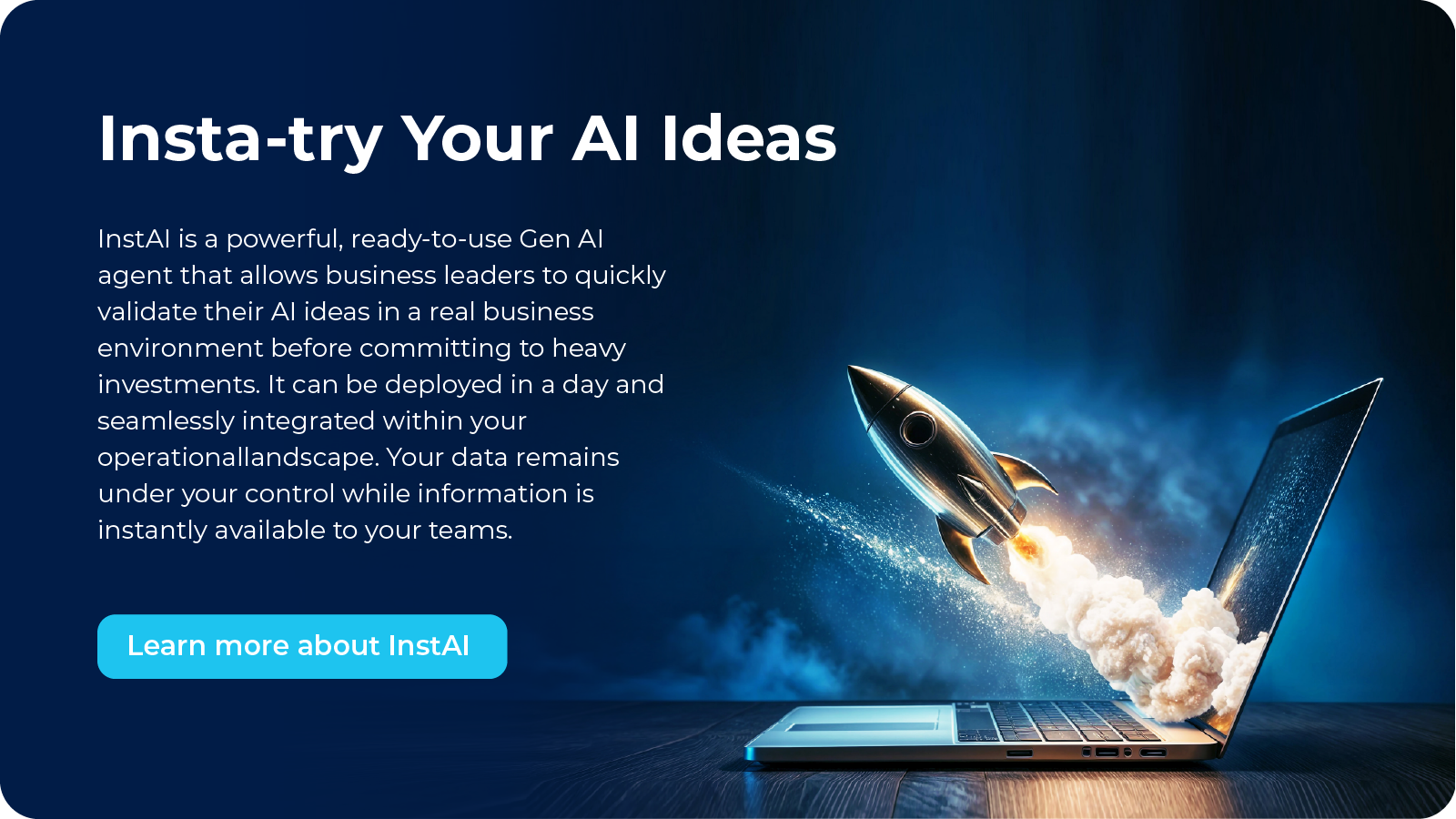AI’s integration into business processes is no longer a futuristic concept but a reality. There is no denying that it is a transformative force across many industries. Understanding the most valuable AI use cases is crucial for organizations that strive to stay competitive regardless of business objectives.
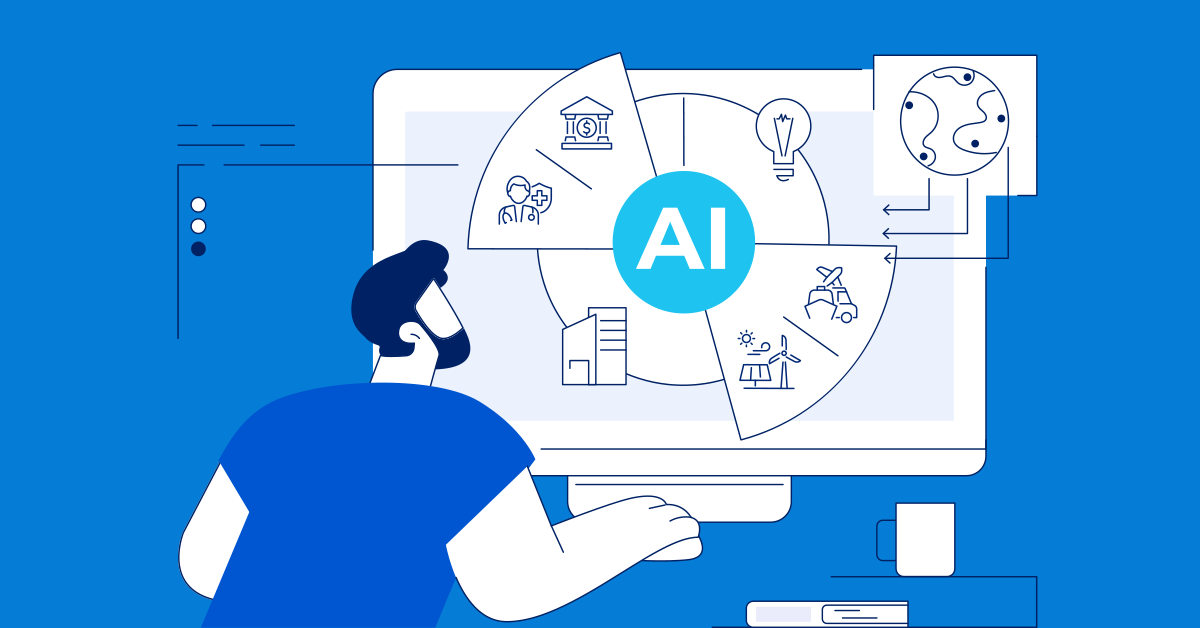
AI’s applications are vast and varied and extend beyond streamlining operations and enhancing customer experiences. It’s important to recognize that AI’s potential is no longer simply in automation. It augments human capabilities, uncovers insights from complex data sets, and enables decision-making at unprecedented speeds.
In this article, we examine how different sectors are leveraging AI to overcome challenges, create opportunities, and redefine industry standards. Industries like healthcare and finance, marketing and manufacturing are already using AI as a core component of modern business strategy. Yes, AI does come at a price, but if managed correctly, its adoption can be the best thing that happens to a business.
Let’s explore how businesses can harness AI to drive growth, enhance efficiency, and create unparalleled value for their stakeholders.
Revolutionizing healthcare with AI
Healthcare is one of the sectors at the forefront of AI adoption. It is often implemented in groundbreaking applications that are transforming patient care, disease detection, and drug discovery. Due to its ability to process vast amounts of medical data, AI is changing what is possible in personalized medicine.
Enhancing patient care through AI-powered diagnostics
AI algorithms are transforming diagnostic processes as they enable faster and more accurate disease identification. They analyze medical imaging data and detect subtle patterns that might escape the human eye. This leads to earlier diagnoses of conditions like cancer, cardiovascular diseases, and neurological disorders.
For example, researchers have developed AI tools that can predict lung cancer risk with remarkable accuracy. Thus, detecting signs of the disease years before they become visible on traditional CT scans is now a reality. Early detection could significantly improve survival rates and treatment outcomes for patients and AI can make this possible.
In addition, AI-powered virtual assistants are enhancing patient engagement by providing round-the-clock support. These tools can reduce the burden on healthcare providers and improve access to care while providing personalized health information.
Accelerating drug discovery and development
Drug discovery is traditionally very time-consuming and costly. Therefore, the pharmaceutical industry is using AI to streamline it. AI algorithms can analyze large data sets, predict drug-target interactions and single out therapeutic candidates very at a pace almost unseen before.
An example of a successful AI implementation was the use of generative AI to create new immunotherapy drugs and in the development of COVID-19 medications. This proves AI can potentially reduce the time and cost of new treatments entering the market.
Optimizing healthcare operations
AI has another important application in healthcare: improving operations and resource management. Predictive analytics powered by AI can forecast patient admission rates, optimize staff scheduling, and manage inventory levels for medical supplies. By increasing operational efficiency, AI helps provide better patient care while significantly reducing costs.
Transforming financial services
The financial sector is among the fields that adopt AI technologies for their potential to enhance decision-making, improve risk management, and provide personalized customer experiences.
Intelligent fraud detection and prevention
AI’s ability to analyze vast amounts of transaction data in real time has revolutionized fraud detection in the financial industry. Financial institutions use AI to prevent losses and ensure the security of their customers. They do this by utilizing machine learning algorithms that identify suspicious and fraudulent activity.
For example, credit card companies use AI solutions to analyze billions of daily transactions and flag potential fraud based on unusual purchase patterns or locations. This proactive approach saves money and enhances customer trust and satisfaction.
Personalized financial advisory products and services
AI-powered robo-advisors are democratizing access to financial planning and investment advice. These platforms use algorithms to assess a client’s financial situation, risk tolerance, and goals to provide tailored investment recommendations. By offering low-cost, automated advisory services, AI is making professional financial guidance accessible to a broader range of consumers.
Streamlining loan underwriting and credit scoring
AI has the potential to boost traditional credit scoring models. It’s able to do that because it analyzes different data points to determine a client’s creditworthiness. To do that, AI employs data sources such as social media and online shopping patterns, which are not considered traditional methods. The result is a more comprehensive and accurate assessment of credit risk, potentially expanding access to financial services for underserved populations.
Enhancing customer experience in retail
The retail sector is leveraging AI to create personalized shopping experiences, optimize inventory management, and predict consumer trends.
AI-powered personalization and recommendations
E-commerce platforms are using AI algorithms to analyze customer behavior, purchase history, and browsing patterns to provide highly personalized product recommendations. As a result, customers report enhanced shopping experiences while companies confirm increased conversion rates.
Intelligent inventory management
Another area that AI helps improve is inventory management. The technology can predict demand, optimize stock levels, and help minimize waste. Machine learning and other AI models can analyze historical sales data, seasonal trends, and external factors like weather or local events to forecast demand accurately. This enables retailers to maintain optimal inventory levels, reducing both stockouts and overstocks.
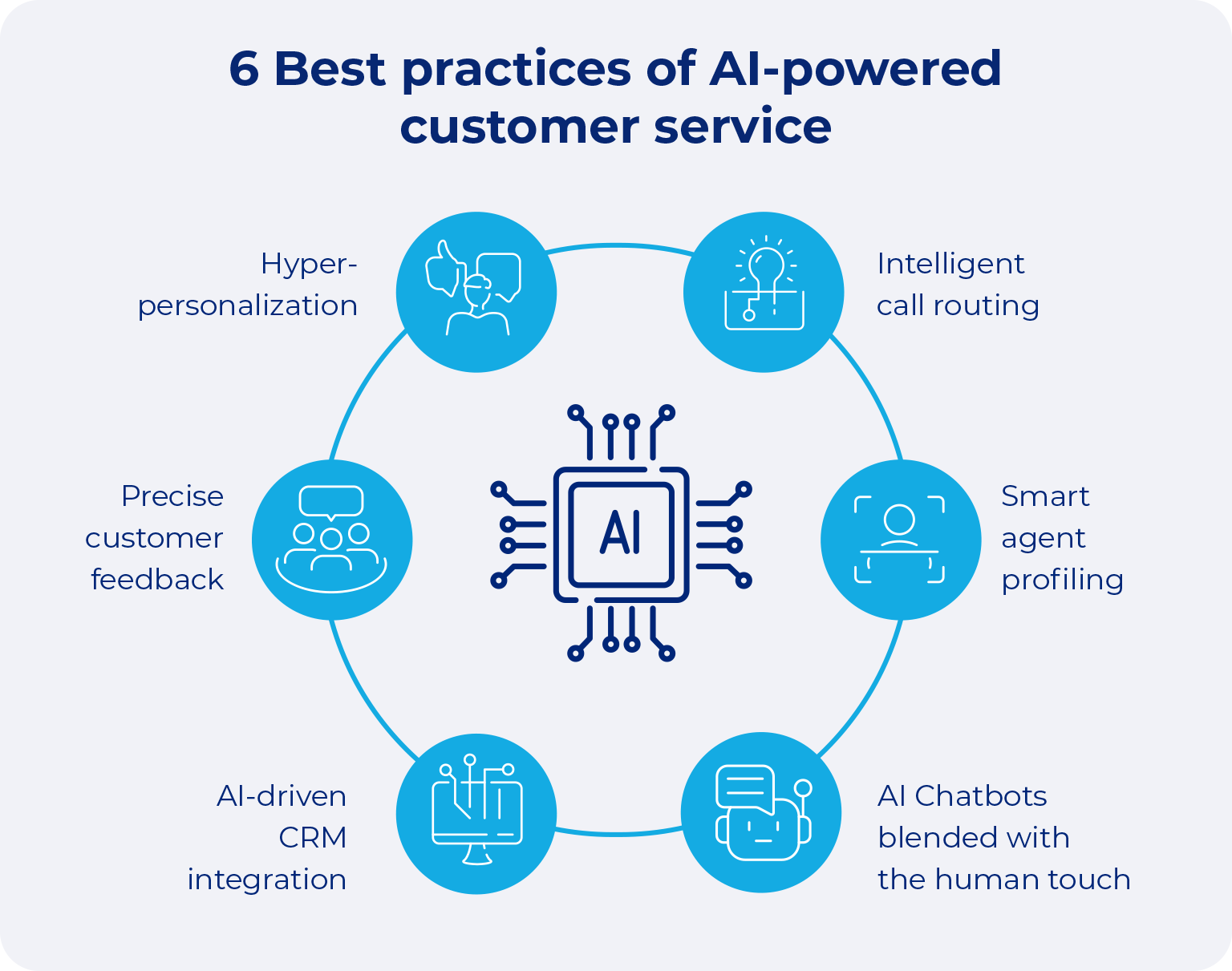
Source: maxicus.com
Virtual try-on and augmented reality experiences
AI-powered augmented reality (AR) technologies are transforming the online shopping experience, particularly in fashion and beauty retail. Virtual try-on tools allow customers to see how products would look on them before making a purchase. As a result, return rates decrease while customer satisfaction increases.
Optimizing manufacturing and supply chain
AI is driving significant improvements in manufacturing efficiency, quality control, and supply chain management.
Predictive maintenance
Thanks to data analysis from different IoT devices, AI algorithms can predict when equipment will fail. This enables manufacturers to plan and organize maintenance in advance. As a result, downtime and maintenance costs are minimized while the lifespan of the machinery is extended.
Quality control and defect detection
Computer vision and machine learning technologies are enhancing quality control processes in manufacturing. AI-powered systems can inspect products at speeds and levels of accuracy that surpass human capabilities, identifying defects that might otherwise go unnoticed.
Quality control is an essential aspect of manufacturing. Technology advancements such as AI, specifically computer vision and machine learning, play a big part in it. They enhance processes and inspect products more quickly and accurately than human agents and identify issues that would otherwise go unnoticed.
Supply chain optimization
AI is benefiting supply chain management because it provides real-time monitoring and predictive analytics. The key is that ML models analyze large data sets and can then optimize routing, help prevent delays, and oversee stock levels throughout the supply chain. This results in lower costs, increased efficiency, and greater resilience to disruptions.
Revolutionizing marketing and advertising
AI is transforming how businesses connect with their customers, enabling more targeted and effective marketing strategies.
Hyper-personalized marketing campaigns
AI algorithms can analyze customer data to create highly personalized marketing messages and offers. By understanding individual preferences, behaviors, and purchase history, businesses can deliver tailored content that resonates with each customer. This personalized content benefits businesses by increasing customer engagement and improving conversion rates.
AI-powered content creation
Generative AI is really pushing the boundaries of creativity in content creation. These systems can produce a variety of materials, from design graphics to video content, enabling marketers to craft high-quality content at scale. However, this does not mean that AI is going to replace human creativity. On the contrary, it is boosting it and adding the benefit of speed and efficiency.
Predictive analytics for customer behavior
AI-driven predictive analytics helps marketers anticipate customer needs and behaviors. Thanks to it, businesses can predict which customers are likely to churn, what products they might be interested in next, and when they’re most likely to make a purchase. This enables proactive marketing strategies that can significantly improve customer retention and lifetime value.
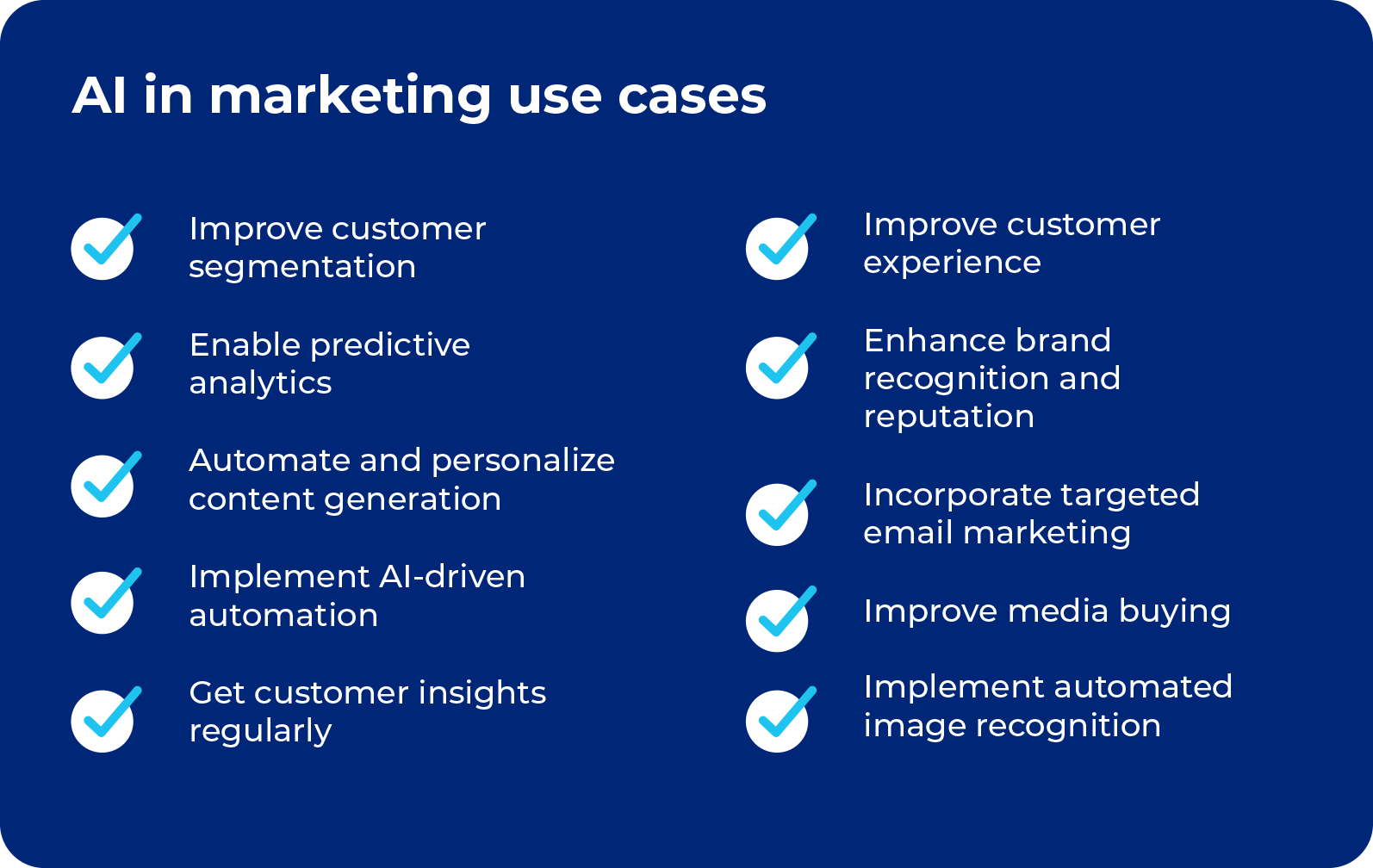
Source: pixelplex.io
Enhancing cybersecurity
As cyber threats become increasingly sophisticated, AI is playing a crucial role in protecting businesses and their data.
Automated threat detection and response
Potential threats are easier and faster to detect when AI is on your team. AI-powered security can monitor network traffic and identify threats faster than any human agent. In addition, ML algorithms can detect patterns that indicate cyber-attacks and enable fast responses and mitigation.
Behavioral analysis for insider threat detection
AI systems can flag unusual activities when detecting potential security breaches or data theft attempts. They can analyze patterns by creating a baseline of normal behavior and then identifying deviations.
Adaptive security measures
When new threats arise, AI allows security systems to respond appropriately. This is possible because the technology enables systems to adapt and mature. Their ability to detect and counteract emerging threats is largely due to good ML models that can continuously learn from new data.
Transforming human resources
AI is having a transformative effect on HR practices in areas from recruitment to employee engagement and retention.
AI-powered recruitment and candidate screening
AI algorithms can analyze resumes, conduct initial screenings, and even assess a candidate’s fitness based on different parameters. This speeds up the recruitment process, helps reduce bias, and improves the quality of hires.
Predictive analytics for employee retention
AI’s capabilities in HR extend to predicting which employees could leave the company. It does this by analyzing employee data so that HR teams can take proactive steps to boost retention rates. These could include offering targeted training or addressing concerns head-on.
Personalized learning and development
Personalized learning and development are key tools in supporting employee retention. AI-powered systems can assist this process by creating tailored learning paths based on roles, skills, and long-term career goals. As a result, this enhances job satisfaction and strengthens organizational capabilities.
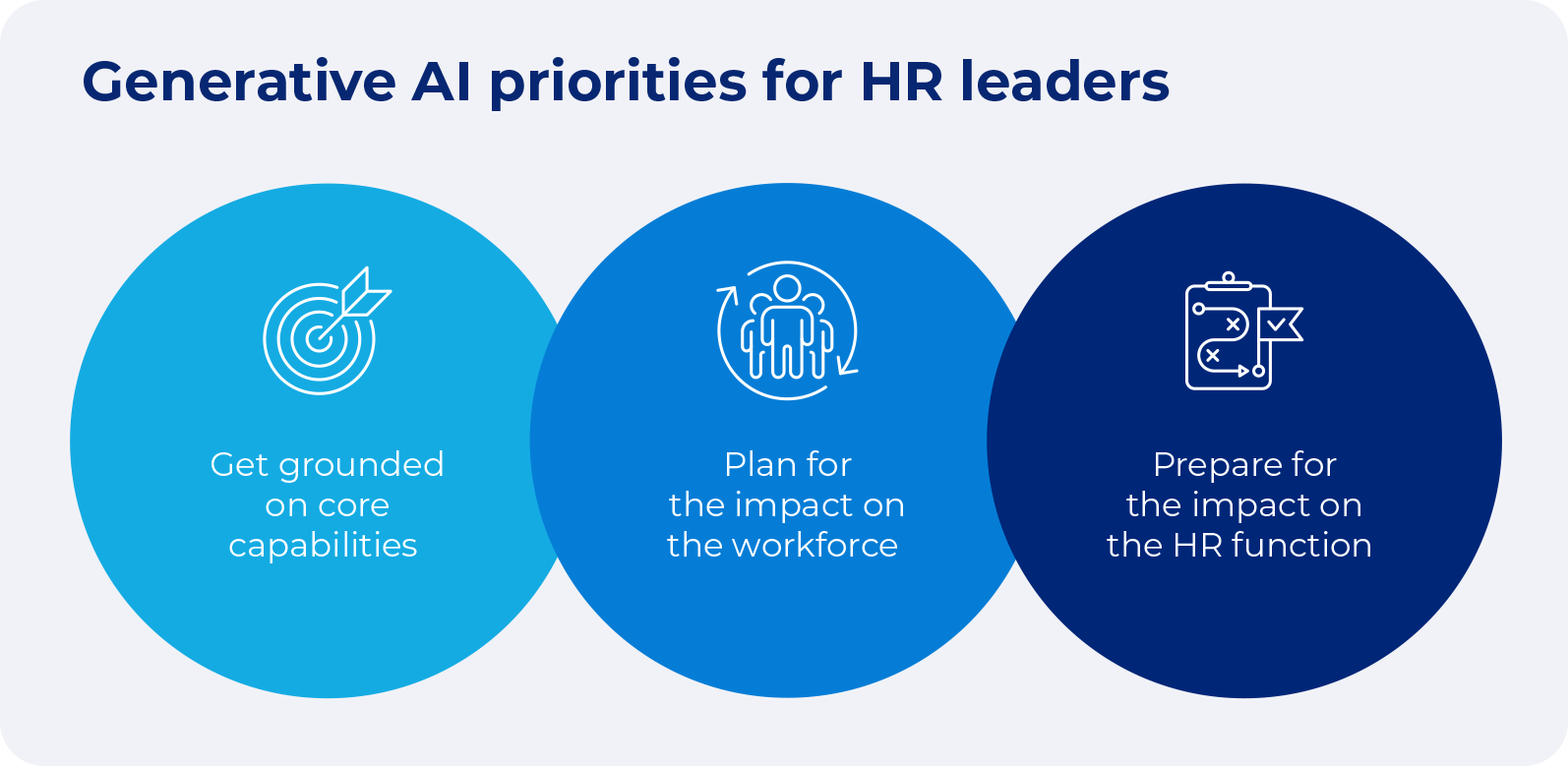
Enhancing customer service
AI is transforming customer service, enabling businesses to provide faster, more efficient, and personalized support.
Intelligent chatbots and virtual assistants
AI-powered digital assistants are a great asset in customer support due to their 24/7 response capabilities. They can handle a large number of inquiries almost instantly and provide personalized support. These systems can understand natural language and learn from interactions, leaving human agents free to focus on more challenging issues.
Sentiment analysis for customer feedback
AI algorithms can analyze customer feedback across various channels, including social media, reviews, and support tickets, to gauge sentiment and identify trends. Customer insights then help businesses improve their products before issues arise.
Predictive customer service
By analyzing customer behavior patterns and some historical data, AI can predict when a customer is likely to need support and proactively offer assistance. This significantly boosts customer satisfaction and loyalty.
Optimizing energy management
AI has the power to aid in optimizing energy consumption and transitioning to renewable energy resources.
Smart grid management
To optimize energy distribution, AI algorithms analyze data from different sources. These include meters and smart sensors that help predict demand and integrate renewable energy sources more efficiently. This reduces energy waste and improves grid stability.
Energy consumption optimization
In commercial and industrial settings, AI can analyze energy usage patterns and environmental factors to optimize HVAC systems, lighting, and other energy-intensive processes. This helps reduce operational costs and increase energy savings.
Predictive maintenance for energy infrastructure
AI-powered predictive maintenance can help energy companies anticipate equipment failures and schedule maintenance proactively. This approach minimizes downtime, extends the lifespan of critical infrastructure, and ensures a more reliable energy supply.
Revolutionizing transportation and logistics
AI is transforming logistics by improving efficiency, safety, and sustainability.
Autonomous vehicles and fleet management
AI is at the heart of autonomous vehicle technology, enabling safer and more efficient transportation. In logistics, AI-powered fleet management systems can optimize routes, predict maintenance needs, and improve fuel efficiency.
Demand forecasting and capacity planning
AI algorithms can analyze historical data, market trends, and external factors to forecast demand for transportation and logistics services. This enables companies to optimize their capacity planning, reducing costs and improving service levels.
Last-mile delivery optimization
AI is revolutionizing last-mile delivery by optimizing routes, predicting delivery times, and even enabling autonomous delivery vehicles and drones. These innovations are helping businesses meet the growing demand for fast and efficient delivery services.
Enhancing agriculture and food production
AI is driving significant advancements in agriculture, helping to increase crop yields, reduce resource usage, and improve food safety.
Precision agriculture
AI-powered systems can analyze data from satellites, drones, and ground sensors to provide farmers with insights on crop health, soil conditions, and optimal resource usage. This enables more precise application of water, fertilizers, and pesticides.
Crop disease detection and prevention
Machine learning algorithms analyze visuals of crops to detect disease or pest infestation early and allow for timely intervention. This can significantly reduce crop losses and minimize the use of pesticides.
Supply chain optimization for food safety
Integrating AI can enhance food safety by tracking products throughout the supply chain, predicting potential contamination risks, and enabling rapid response to food safety issues. This protects consumers and helps businesses maintain compliance.
Conclusion
The most valuable AI use cases for business span across industries, offering transformative potential in areas ranging from healthcare and finance to manufacturing and agriculture.
As AI technologies evolve, their impact on business operations and strategies will grow. Organizations that successfully implement these AI use cases will drive innovation, efficiency, and growth across all of their AI projects.
To fully take advantage of AI, businesses must approach implementation strategically. This means ensuring they have the right data infrastructure, talent, and ethical frameworks in place. While there are different steps to implementing AI in business, it fundamentally requires careful planning, execution, and continuous maintenance.



